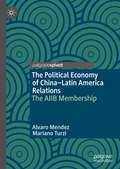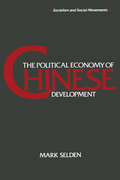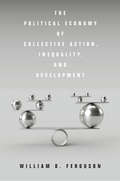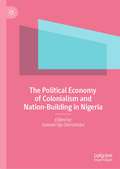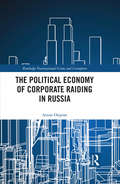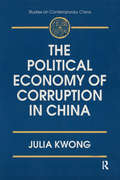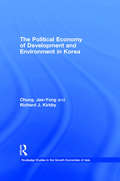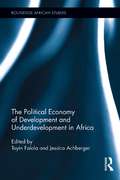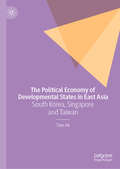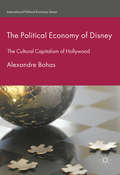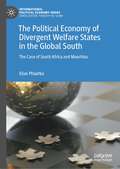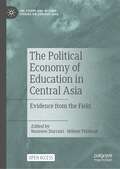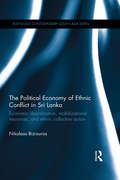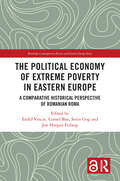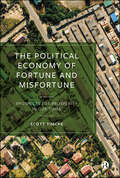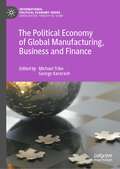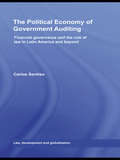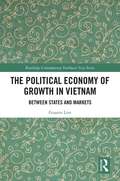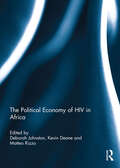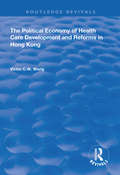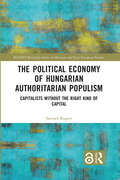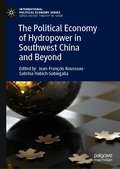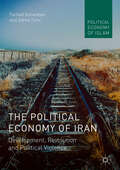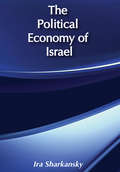- Table View
- List View
The Political Economy of China–Latin America Relations: The AIIB Membership
by Mariano Turzi Alvaro MendezThe book explores the ways in which Latin American states are capitalizing or failing to capitalize on the initiatives of China in world affairs. The authors hypothesize that a dearth of regional agency and social construction, and a consequent institutional deficit in foreign relations, characterizes Latin America and its inadequate reaction to Chinese agency. The volume includes multiple case studies from eight Latin American countries and discusses the Asian Infrastructure Investment Bank’s initiatives and policies. The book will interest scholars, researchers, policy-makers, foreign policy analysts, and graduate students in Latin American and Asian politics as well as development studies and political economy.
The Political Economy of Chinese Development (Socialism And Social Movements Ser.)
by Mark SeldenThe first edition of "The Political Economy of Chinese Socialism" reconceptualized the political economy of China by highlighting the changing character of urban-rural and state-society conflicts in the era of Mao Zedong's leadership and in the contemporary post-Mao reforms. The economic and social crises that engulfed China - and indeed much of the rest of the socialist world - in the late 1980s, culminating in the 1989 democratic movement and its suppression, stimulated a rethinking of central propositions of the first edition. It particularly led the author to inquire anew into the meaning of socio-political as well as economic development in a populous and poor agrarian nation. This volume, then, assesses the economic performance and social consequences of China's political economy over four decades, with a focus on China's countryside and city-countryside relations. In addition to a reconceptualization and updating of the introductory chapter, there is a new chapter, "The Social Origins and Limits of the Chinese Democratic Movement".
The Political Economy of Collective Action, Inequality, and Development
by William D. FergusonThis book examines how a society that is trapped in stagnation might initiate and sustain economic and political development. In this context, progress requires the reform of existing arrangements, along with the complementary evolution of informal institutions. It involves enhancing state capacity, balancing broad avenues for political input, and limiting concentrated private and public power. This juggling act can only be accomplished by resolving collective-action problems (CAPs), which arise when individuals pursue interests that generate undesirable outcomes for society at large. Merging and extending key perspectives on CAPs, inequality, and development, this book constructs a flexible framework to investigate these complex issues. By probing four basic hypotheses related to knowledge production, distribution, power, and innovation, William D. Ferguson offers an analytical foundation for comparing and evaluating approaches to development policy. Navigating the theoretical terrain that lies between simplistic hierarchies of causality and idiosyncratic case studies, this book promises an analytical lens for examining the interactions between inequality and development. Scholars and researchers across economic development and political economy will find it to be a highly useful guide.
The Political Economy of Colonialism and Nation-Building in Nigeria
by Samuel Ojo OloruntobaThis book examines the ways in which colonialism continues to define the political economy of Nigeria sixty years after gaining political independence from the British. It also establishes a link between colonialism and the continued agitation for restructuring the political arrangement of the country. The contributions offer various perspectives on how the forceful amalgamation of disparate units and diverse nationalities have undermined the realization of the development potential of Nigeria.The book is divided into two parts. The first part interrogates the political economy of colonialism and the implications of this on economic development in contemporary Nigeria. The second part examines nation-building, governance, and development in a postcolonial state. The failure of the postcolonial political elites to ensure inclusive governance has continued to foster centrifugal and centripetal forces that question the legitimacy of the state. The forces have deepened calls for secession, accentuated conflicts and predispose the country to possible disintegration. A new government approach is required that would ensure equal representation, access to power and equitable distribution of resources.
The Political Economy of Corporate Raiding in Russia (Routledge Transnational Crime and Corruption)
by Ararat OsipianCorporate raiding – the shocking phenomenon whereby criminals, business rivals and even state bureaucrats visit business headquarters and force owners or staff to transfer business assets, land or property – is an increasing problem in Russia. This book, based on extensive original research, provides a comprehensive overview of this activity. It describes the nature of corporate raiding, provides numerous case studies and discusses the role of the state and government officials. Overall the book argues that the prevailing climate of business and government in Russia leads to a situation where control is closely linked to corruption and coercion.
The Political Economy of Corruption in China (Studies On Contemporary China)
by Julia KwongThis text examines all facets of corruption: meaning, incidence, monetary value, the kinds of goods exchanged, the perpetrators and their strategies, in China since 1949. It explores the irony of how ideology and organizational structures under socialism can both restrain and encourage corruption.
The Political Economy of Development and Environment in Korea (Routledge Studies in the Growth Economies of Asia)
by Jae-Yong Chung Richard J. KirkbyThis book looks at Korea's economic, social and spatial development processes from the early Modernisation period to the financial crisis of 1997. It focuses on the political and ideological control of the state during the developmental era, as well as the environmental problems of Korea, and examines how society and environment have been used as means to attain rapid accumulation. Providing an holistic approach to Korean development, this title allows a comprehensive view of Korea's economic miracle as well as its recent problems.
The Political Economy of Development and Underdevelopment in Africa (Routledge African Studies #10)
by Toyin Falola Jessica AchbergerWhile Africa is too often regarded as lying on the periphery of the global political arena, this is not the case. African nations have played an important historical role in world affairs. It is with this understanding that the authors in this volume set out upon researching and writing their chapters, making an important collective contribution to our understanding of modern Africa. Taken as a whole, the chapters represent the range of research in African development, and fully tie this development to the global political economy. African nations play significant roles in world politics, both as nations influenced by the ebbs and flows of the global economy and by the international political system, but also as actors, directly influencing politics and economics. It is only through an understanding of both the history and present place of Africa in global affairs that we can begin to assess the way forward for future development.
The Political Economy of Developmental States in East Asia: South Korea, Singapore and Taiwan
by Tian HeThis book explores the variations in the transformation of the Asian developmental state in South Korea, Singapore, and Taiwan. Based on an original theory, the author argues that these variations are influenced by two factors: industrial structure and democratic transition, both of which are shaped by the strategic calculations of the ruling elites to maintain power. The theory concerns two concurrent political processes during the state’s development process, namely the emergence of economic interest groups with varying levels of policy constraints on the state; and the process of democratic transition driven by the rise of the middle class. The book will appeal to students and researchers in the fields of Asian politics, development studies, political economy and comparative politics.
The Political Economy of Disney
by Alexandre BohasThis book sheds new light on the socio-economic impact of multinational corporations. Combining Cultural Studies and International Political Economy, it provides a revealing analysis of the Walt Disney Company, and by extension the wider Hollywood studio system. It does so by examining the cultural and economic forces powering the industry's expansion, the 'civilisation' that Disney disseminates, and the various ways that societies beyond the USA have adopted facets of the Hollywood productions to which they are exposed. Identifying both the strengths and the weaknesses of these transnational firms, it demonstrates the significance of their contribution to American power and predominance.
The Political Economy of Divergent Welfare States in the Global South: The Case of South Africa and Mauritius (International Political Economy Series)
by Elias PhaahlaThis study traces the welfare regimes of Mauritius and South Africa from the early 20th century focusing on the historical circumstances that gave rise to the dominance of state-funded old-age pensions within their respective welfare frameworks. It highlights intersections between powerful business interests, the state, and social forces that sowed the seeds of social entitlements. Due to different mobilisation efforts of these social actors, both countries have spawned welfare regimes of different persuasions. Mauritius has maintained its long-standing traditions as a social democracy stretching back to the late 1950s, while South Africa continues relentlessly in pursuit of a liberal welfare state, a journey it has treaded since 1928 when the old-age pension laws first came into effect. While unravelling the innermost workings of welfare state development in Mauritius and South Africa, it also probes the present political and economic circumstances that have kept these two welfare regimes resolutely unchanged. Against this backdrop, it draws parallels between current welfare outcomes and those of old as they continue to chart their way into the future.
The Political Economy of Education in Central Asia: Evidence from the Field (The Steppe and Beyond: Studies on Central Asia)
by Naureen Durrani Hélène ThibaultThis open access book is intended as an original contribution to the conversation on the role and challenges of education in Central Asia to promote social cohesion by looking at Kazakhstan, Tajikistan and Uzbekistan. Examining education challenges within the countries’ wider historical, social, political, and cultural context, the contributions explore existing discourses concerning national identity, religion, language, gender, inclusion, internationalisation of education, and non-state actors through a Political Economy Analysis (PEA) lens. With the understanding that education is both a powerful mechanism of social reproduction in societies and a driver of social change, the book attempts to promote political economy analysis of education as a helpful analytical tool for educational debates and reform agendas in the region and thus will be a valuable resource for policymakers, practitioners, and scholars in this region and beyond.
The Political Economy of Ethnic Conflict in Sri Lanka: Economic Liberalization, Mobilizational Resources, and Ethnic Collective Action (Routledge Contemporary South Asia Series)
by Nikolaos BiziourasAt the point of independence in 1948, Sri Lanka was projected to be a success story in the developing world. However, in July 1983 a violent ethnic conflict which pitted the Sinhalese against the Tamils began, and did not come to an end until 2009. This conflict led to nearly 50,000 combatant deaths and approximately 40,000 civilian deaths, as well as almost 1 million internally-displaced refugees and to the permanent migration abroad of nearly 130,000 civilians. With a focus on Sri Lanka, this book explores the political economy of ethnic conflict, and examines how rival political leaders are able to convince their ethnic group members to follow them into violent conflict. Specifically, it looks at how political leaders can influence and utilize changes in the level of economic liberalization in order to mobilize members of a certain ethnic group, and in the case of Sri Lanka, shows how ethnic mobilization drives can turn violent when minority ethnic groups are economically marginalized by the decisions that the majority ethnic group leaders make in order to stay in power. Taking a political economy approach to the conflict in Sri Lanka, this book is unique in its historical analysis and provides a longitudinal view of the evolution of both Tamil and Sinhalese ethnic drives. As such, this interdisciplinary study will be of interest to policy makers as well as academics in the field of South Asian studies, political science, sociology, development studies, political economy and security studies.
The Political Economy of Extreme Poverty in Eastern Europe: A Comparative Historical Perspective of Romanian Roma (Routledge Contemporary Russia and Eastern Europe Series)
by Enikő Vincze, Cornel Ban, Sorin Gog and Jon Horgen FribergThis book examines the creation of extreme poverty in Eastern Europe, focusing on Romanian Roma, through a comparative historical perspective on its roots and the socio-economic and political mechanisms that have shaped it in labor, housing, and migration. This interdisciplinary book explores the (re)production of extreme poverty among the Roma across different political economy regimes. Chapters engage in comparative historical analysis across several disciplines and integrate perspectives steeped at the national level of analysis with those dwelling intensively on a single context. Focusing on the processes of manufacturing poverty among Roma in Romania, the chapters cover empirical information about the historical transformations of the economic situation of the Roma in Romania from the 19th century to the present, about global, national, and local processes of industrialization, deindustrialization, and reindustrialization impacting poverty among the Roma in the past seven decades, and about Roma people’s current labor positions, housing conditions, and migration practices in distinct geographies from Romania to Norway. The book situates Roma poverty research in a Central and Eastern European context by highlighting its connections with analytical approaches to poverty and institutional policy visions about poverty eradication. It will be of interest to researchers studying Central and Eastern Europe, political economy of socialism, political economy of capitalist transformations, poverty studies, welfare and housing regimes studies, and labor and migration studies.
The Political Economy of Fortune and Misfortune: Prospects for Prosperity in Our Times
by Scott TimckeLuck greatly influences a person’s quality of life. Yet little of our politics looks at how institutions can amplify good or bad luck that widens social inequality. But societies can change their fortune. Too often debates about inequality focus on the accuracy of data or modelling while missing the greater point about ethics and exploitation. In the wake of growing disparity between the 1% and other classes, this book combines philosophical insights with social theory to offer a much-needed political economy of life chances. Timcke advances new thought on the role luck plays in redistributive justice in 21st century capitalism.
The Political Economy of Global Manufacturing, Business and Finance (International Political Economy Series)
by George Kararach Michael TribeThis book is written as a tribute to Frederick Nixson’s extensive work on industrial development in the Global South, while seeking to actively engage with the latest arguments concerning development economics, together with changes in manufacturing and industrial policy that continue to shape the role of the Global South in the international economy, the impact of the increased concentration of global multinational corporations in that space, along with the rise of new financing tools and debt traps. The chapters pay homage to Fred’s broad view of the international development process and reflect his breadth of perception both theoretically and geographically. The book targets both the scholarly and policymaking audience.
The Political Economy of Government Auditing: Financial Governance and the Rule of Law in Latin America and Beyond (Law, Development and Globalization)
by Carlos SantisoThe Political Economy of Government Auditing addresses the elusive quest for greater transparency and accountability in the management of public finances in emerging economies; and, more specifically, it examines the contribution of autonomous audit agencies (AAAs) to the fight against corruption and waste. Whilst the role of audit agencies in curbing corruption is increasingly acknowledged, there exists little comparative work on their institutional effectiveness. Addressing the performance of AAAs in emerging economies, Carlos Santiso pursues a political economy perspective that addresses the context in which audit agencies are embedded, and the governance factors that make them work or fail. Here, the cases of Argentina, Brazil and Chile are examined, as they illustrate the three – parliamentary, court and independent – models of AAAs in modern states, and their three distinct trajectories of reform, or lack of reform. Beyond Latin America, considerations on the reform of government auditing in other countries, developed and developing are also taken up as, it is argued, while institutional arrangements for government auditing matter, political factors ultimately determine the effectiveness of AAAs. Reforming AAAs, it is concluded, must consider the trajectory of state building, the role of law in public administration and the quality of governance. An important contribution to the comparative study of governance institutions, and especially those tasked with overseeing the budget and curbing corruption, The Political Economy of Government Auditing will be of interest to scholars and students of comparative politics, development studies, administrative law, and public finance; as well as to development practitioners and policy-makers in developing countries, donor governments and international institutions.
The Political Economy of Growth in Vietnam: Between States and Markets (Routledge Contemporary Southeast Asia Series)
by Guanie LimSince the doi moi reforms in 1986, Vietnam has experienced a dramatic socioeconomic transformation. Lim examines the role of the state and its interaction with market forces in bringing this change about. Taking the motorcycle and banking industries as case studies, this book explores the dynamics between the state and transnational corporations in shaping the manufacturing and service sectors, respectively. Vietnam, as one of Southeast Asia’s quintessential latecomer economies with little prior experience of dealing with transnational corporations, has nevertheless been quite successful in maintaining some control over the impact of foreign direct investment. Yet, the learning outcomes remain highly uneven. In addition, Lim argues that Vietnamese advancement in both industries mirrors only partially the more generalized patterns of state-led development in East Asia’s earlier batch of latecomer economies. Vietnam’s case thus presents practical lessons on how to succeed in crafting and utilizing policy instruments to achieve domestic economic and technological upgrading. This book will be of great interest to scholars of political economy and industrial policy in East Asia, as well as to scholars and policy professionals analyzing approaches to development strategy more broadly.
The Political Economy of HIV in Africa: The Political Economy Of Hiv In Africa
by Deborah Johnston, Kevin Deane and Matteo RizzoBiomedical revolutions seem to have radically altered the environment for HIV transmission: anti-retrovirals (ARVs) and drugs to reduce mother-to-child transmission promise to cut HIV transmission rates, as does male medical circumcision. However, the hopeful messages of UNAIDS are tempered with warning about expenditure shortfalls and calls for funding. Contributions to this book remind us that, along with the external financial constraints, there have been new fractures in state power and in the organisation of health systems. More than this, the book fundamentally calls into question whether biomedical interventions can change the social roots of this disease. As well as considering new policy approaches, the book reasserts a long-standing political economy approach to HIV and to adapt it to reflect new competing theoretical approaches. The chapters attempt to connect the debates about HIV/AIDS to larger discussions about globalisation, class differentiation, inequity and uneven development in African countries. This book was originally published as a special issue of Review of African Political Economy.
The Political Economy of Health Care Development and Reforms in Hong Kong (Routledge Revivals)
by Victor C.W. WongFirst published in 1999, this book constitutes a unique account of the development and reform of health care in Hong Kong. Its main focus is on policy developments since 1945. Victor Wong demonstrates the development of a two-tier health system in both a capitalist and Chinese context. His work is one of both health policy and political economy. Wong utilises the latter perspective to show the state’s role in the interests of capital, the public demand for health care and the power of the medical profession. Alongside this, Wong brings in the role of Chinese and family medicine and the role of the family in cost containment and minimising the hospitalisation of elderly, frail and chronically ill patients. The volume is the most comprehensive analysis available for health policy in Hong Kong.
The Political Economy of Human Happiness
by Benjamin RadcliffData, methods and theories of contemporary social science can be applied to resolve how political outcomes in democratic societies determine the quality of life that citizens experience. Radcliff seeks to provide an objective answer to the debate between left and right over what public policies best contribute to people leading positive and rewarding lives. Radcliff offers an empirical answer, relying on the same canons of reason and evidence required of any other issue amenable to study through social-scientific means. The analysis focuses on the consequences of three specific political issues: the welfare state and the general size of government, labor organization, and state efforts to protect workers and consumers through economic regulation. The results indicate that in each instance, the program of the Left best contributes to citizens leading more satisfying lives and, critically, that the benefits of greater happiness accrue to everyone in society, rich and poor alike.
The Political Economy of Hungarian Authoritarian Populism: Capitalists without the Right Kind of Capital (BASEES/Routledge Series on Russian and East European Studies)
by Samuel RogersThis book emphasises the importance of state-business relations and external capital for structuring and strengthening authoritarian populism in Hungary. It argues these capitalist relations are crucial to understanding the economic aspects of this ideology, which has developed in the country since 2010. The book investigates both ‘internal’ and ‘external’ legs of the Hungarian political economy. First how a politically loyal national capital owning class has subsumed domestic business. Second the government’s operationalisation of ‘new’ inward transnational capital inflows – especially from China and Russia – to finance large-scale infrastructure projects, which complement extant investment particularly from Germany. Together, these developments have strengthened the hegemonic nature of Hungarian Authoritarian Populism, helping the government to continued electoral success. This model of governance is attractive to similar ideological expressions in the region and beyond who look for an example to emulate. The Open Access version of this book, available at http://www.taylorfrancis.com, has been made available under a Creative Commons [Attribution-Non Commercial-No Derivatives (CC BY-NC-ND)] 4.0 license.
The Political Economy of Hydropower in Southwest China and Beyond (International Political Economy Series)
by Jean-François Rousseau Sabrina Habich-SobiegallaThis book conceptualises the ongoing hydropower expansion in Southwest China as a socio-political and transnational project transcending the construction of dams. Chapters in this volume are organised around three sections spanning hydropower and resettlement governance, rural livelihoods, and international relations connected to China’s hydropower expansion. Dam projects of various scales are analysed as infrastructure projects that shape peoples’ livelihoods, the environment, and China’s relations with Southeast Asia, Africa, and Latin America.
The Political Economy of Iran: Development, Revolution and Political Violence (Political Economy of Islam)
by Farhad Gohardani Zahra TizroThis study entails a theoretical reading of the Iranian modern history and follows an interdisciplinary agenda at the intersection of philosophy, psychoanalysis, economics, and politics and intends to offer a novel framework for the analysis of socio-economic development in Iran in the modern era. A brief review of Iranian modern history from the Constitutional Revolution to the Oil Nationalization Movement, the 1979 Islamic Revolution, and the recent Reformist and Green Movements demonstrates that Iranian people travelled full circle. This historical experience of socio-economic development revolving around the bitter question of “Why are we backward?” and its manifestation in perpetual socio-political instability and violence is the subject matter of this study. Michel Foucault’s conceived relation between the production of truth and production of wealth captures the essence of hypothesis offered in this study. Foucault (1980: 93–94) maintains that “In the last analysis, we must produce truth as we must produce wealth; indeed we must produce truth in order to produce wealth in the first place.” Based on a hybrid methodology combining hermeneutics of understanding and hermeneutics of suspicion, this monograph proposes that the failure to produce wealth has had particular roots in the failure in the production of truth and trust. At the heart of the proposed theoretical model is the following formula: the Iranian subject’s confused preference structure culminates in the formation of unstable coalitions which in turn leads to institutional failure, creating a chaotic social order and a turbulent history as experienced by the Iranian nation in the modern era. As such, the society oscillates between the chaotic states of socio-political anarchy emanating from irreconcilable differences between and within social assemblages and their affiliated hybrid forms of regimes of truth in the springs of freedom and repressive states of order in the winters of discontent. Each time, after the experience of chaos, the order is restored based on the emergence of a final arbiter (Iranian leviathan) as the evolved coping strategy for achieving conflict resolution. This highly volatile truth cycle produces the experience of socio-economic backwardness and violence. The explanatory power of the theoretical framework offered in the study exploring the relation between the production of truth, trust, and wealth is demonstrated via providing historical examples from strong events of Iranian modern history. The significant policy implications of the model are explored. This monograph will appeal to researchers, scholars, graduate students, policy makers and anyone interested in the Middle Eastern politics, Iran, development studies and political economy.
The Political Economy of Israel
by Ira SharkanskyThe resurgence of political economy as an important topic reflects the deep interpenetration of politics and economics. There are few economic issues of consequence that are not shaped by government decisions, and there are few governments whose agendas are not dominated by economic issues. No country reflects the interpenetration of politics and economics as much as Israel.In this analysis, Ira Sharkansky examines the extensive involvement of the Israeli government in the country's economy, reflected in governmental expenditures that exceed the gross national product, intimate links between governmental activity and Israeli's standard of living, high inflation and other economic problems, and policymaking behaviors that include entrepreneurialism and indirection. He explores the strategic points of Israel's political economy, pursuing a qualitative analysis of Israeli problems and strategies for dealing with them. Those interested in policy analysis, political economy, comparative politics, comparative public administration, and Israeli politics will find this book invaluable.Contents: The Political Economy of Israel; What is the Israeli State? How Large is the Government Budget?; Israel's Standard of Living; Israeli Municipalities: Local Initiative amidst Central Controls; Who Gets What amidst High Inflation? Winners and Losers in the Israeli Budget 1978-1984; Conundrums of Israel's Political Economy: Problems without Solutions; Public Sector Entrepreneurialism; Policymaking by Indirection; Perspective on Israel's Political Economy.
